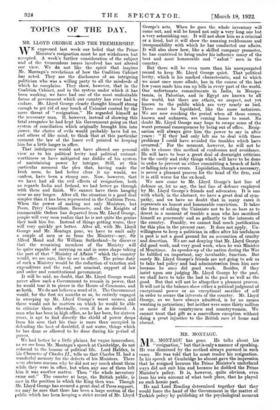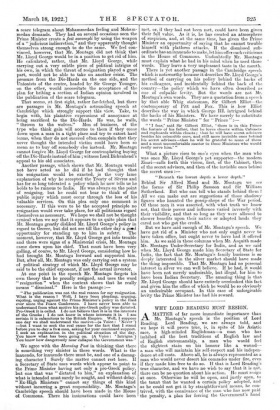MR. MONTAGU.
MR.. MONTAGU has gone. He talks about his "resignation," but that is only a manner of speaking. He was dismissed by the method always pursued in such cases. He was told that he must tender his resignation. In his speech at Cambridge he almost gave the impression that he resigned because the Prime Minister's underhand ways did not suit him and because he disliked the Prime Minister's policy. It is, however, quite obvious, even from his own account of what took place, that he played no such heroic part. He and Lord Reading determined together that they would force the hand of the Government in the matter of Turkish policy by publishing at the psychological moment a scare telegram about Mohammedan feeling and Moham- medan demands. They had on several occasions seen the Prime Minister create a fait accompli by using the weapon of a "judicious indiscretion," and they apparently thought themselves strong enough to do the same. We feel con- vinced, however, that Mr. Montagu did not think that Mr. Lloyd George would be in a position to get rid of him. He calculated, rather, that Mr. Lloyd George, while carrying out a very subtle piece of political intrigue of his own, in which the threat of resignation played a great part, would not be able to take on another crisis'. The pressure from the Die-Hards on the one side, and the Unionists of the centre, headed by Sir George Younger, on the other, would necessitate the acceptance of the plan for bribing a section of Indian opinion involved in the publication of the scare telegram. That seems, at first sight, rather far-fetched, but there are passages in Mr. Montagu's astounding speech at Cambridge which strongly support this view. Take, to begin with, his plaintive expressions of annoyance at being sacrificed to the Die-Hards. He was, he wails, "thrown to the wolves." Men of business, of the type who think gain will accrue to them if they come down upon a man in a tight place and try to extort hard terms, when they do not succeed often complain that they never thought the intended victim could have been so mean as to buy off somebody else instead. Mr. Montagu cannot forgive Mr. Lloyd George for contemplating buying off the Die-Hards instead of him ; witness Lord Birkenhead's appeal to his old associates. Another passage, which shows that Mr. Montagu would not have acted as he did if he had thought that his resignation would be exacted, the very lame• explanation of why he accepted the Treaty of Sevres and has for so long tolerated a policy which he now tells us he holds to be ruinous to India. He was always on the point of resigning, but he could not bear to think of the public injury which must occur through the loss of his valuable services. On this plea only one comment is necessary. If this were to be the accepted principle no resignation would ever take place, for all politicians regard themselves as necessary. We hope we shall not be thought cynical when we say that it appears to us quite plain that Mr. Montagu greatly disliked Mr. Lloyd George's policy in regard to Greece, but did not see till the other day a good opportunity for standing up to him in safety. The moment, however, that Mr. Lloyd George got into trouble and there were signs of a Ministerial crisis, Mr. Montagu came down upon his chief. That must have been very galling, of course, to Mr. Lloyd George, considering how he had brought Mr. Montagu forward and supported him. But, after all, Mr. Montagu was only carrying out a system of political strategy of which Mr. Lloyd George may be said to be the chief exponent, if not the actual inventor.
At one point in the speech Mr. Montagu forgets his own theory that he proudly resigned, and uses the word " resignation " when the context shows that he really means "dismissal." Here is the passage :— " The publication was not the real reason for my resignation. What is the reason ? Well, I have been pleading, arguing, cajoling, urging against the Prime Minister's policy in tho East ever since the Peace Conference. I have never been able to understand from what motive his pro-Greek policy was dictated. Pro-Greek it is called. I do not believe that it is in the interests of the Greeks ; I do not know in whose interests it is. I am certain it is calamitous to the British Empire. Well, I suppose one day we shall understand the motive—(a Voice : Never ) —but I want to seek the real cause for the fact that I stand before you to-day a free man, asking for your continued support. I seek an explanation in the political situation of the day. You know what has been going on. (A Voice 'Intrigue.') You know how dangerously near collapse the Government was."
We agree with the Morning Post in thinking that there is something very sinister in these words. What is the innuendo, for innuendo there must be, and one of a damag- ing character ? Surely the matter cannot rest here. If a Secretary of State uses words which appear to point to the Prime Minister having not only a pro-Greek policy, but one that was "dictated to him," an explanation of what is intended must surely be sought, and without delay. "Ex-High Ministers" cannot say things of this kind without incurring a great responsibility. Mr. Montagu's Cambridge speech should have been made in the House of Commons. There his insinuations could have been met, or, if they had not been met, could have been given their full value. As it is, he has created an atmosphere of suspicion, and, at the same time, has given the Prime Minister an opportunity of saying that he cannot trouble himself with platform attacks. If the dismissed sub- ordinate has an innuendo to make, let him offer such criticisms in the House of Commons. Undoubtedly Mr. Montagu must explain what he had in his mind when he used those words. They leave a very unpleasant taste in the mouth.
There is yet another passage in the Cambridge speech which is noteworthy because it describes Mr. Lloyd George's method of carrying on his policy behind the backs of his colleagues, and incidentally behind the back of the country—the policy which we have often described as one of culpable levity. But the words are not Mr. Montagu's own words. They are a quotation from a speech by that able Whig statesman, Sir Gilbert Elliot—the contemporary of Pitt and Fox. This is how Elliot describes the way in which George III. intrigued behind the backs of his Ministers. We have merely to substitute the words "Prime Minister" for " Prince ' :— " ' I fear,' said Sir Gilbert Elliot, 'there is in this Prince the feature of his father, that he loves closets within Cabinets and clipboards within closets ; that ho will have secret advisors besides his ostensible ones, and still more invisible ones behind his secret advisers—that he will be grateful to none of thorn and a most uncomfortable master to those Ministers who would really serve him.'" What a picture rises to one's eyes when the man who was once Mr. Lloyd George's pet supporter—the modern Zimri—calls forth this vision, first, of the Cabinet, then of the secret advisers, and then of the invisible ones behind the secret ones :-- " Beneath the lowest depth a lower depth."
Behind Sir Alfred Mond and Mr. Montagu we see the forms of Sir Philip Sassoon and Sir William Sutherland. But who can tell who stands behind them ? All we can make out are suggestions of those shadowy figures who haunted the gossip-shops of the War period. Of these men it was asserted, with what truth we know not, that their power and influence varied inversely with their visibility, and that so long as they were allowed to shower benefits upon their native or adopted lands they cared not who got the credit.
But we have said enough of Mr. Montagu's speech. We have got rid of a Minister who not only ought never to have taken office, but ought never to have had it offered him. As we said in these columns when Mr. Asquith made Mr. Montagu Under-Secretary for India, and as we said when Mr. Lloyd George made him Secretary of State for India, the fact that Mr. Montagu's family business is so deeply interested in the silver market should have made the thing impossible. That Mr. Montagu had no personal interest in silver we can well believe. If he had, it would have been not merely undesirable, but illegal, for him to have been Indian Secretary. The amazing thing is that Mr. Lloyd George should have entirely overlooked this fact and given him the office of which he would be so obviously an undesirable occupant In this case of unforgivable levity the Prime Minister has had his reward.



































 Previous page
Previous page